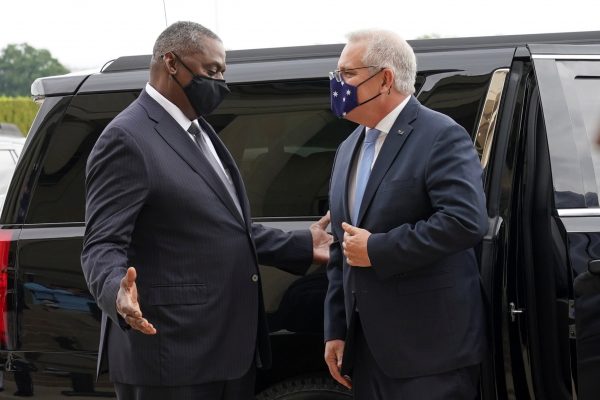While there was less overt drama in the reaction to AUKUS in Australia’s own region, there are signs of some far more substantial challenges for how Australia charts a diplomatic path in the Asia Pacific over the coming decades.
In our lead article this week, Evan Laksmana discusses the gaps — in communication and in thinking — that AUKUS has revealed between Australia and Indonesia. He reckons that ‘AUKUS shows just what happens when the regional strategic visions of Australia and Indonesia are misaligned in how they view their bilateral ties and the world around them’.
On the surface, Australia–Indonesia ties look strong. Australia’s Defence Minister Peter Dutton and Foreign Minister Marise Payne travelled to Jakarta for 2+2 meetings the week before the AUKUS announcement and began talks on boosting the two countries’ defence relationship. Yet it was only after the AUKUS announcement that the Indonesian side was briefed. Indonesia’s foreign ministry responded with a chilly statement about the risks the deal poses to regional stability and non-proliferation.
To be sure, nobody expects Australia to give Indonesia a running commentary on its most sensitive military and strategic policy deliberations. Likewise, nobody is asking Australia to give Indonesia a veto over its defence policy decisions. The issue is that Australia keeps prosecuting third-rate diplomacy in service of those decisions, repeatedly treating Indonesia’s stake in them as an afterthought, and assuming that Australian good intentions will be taken for granted in Jakarta. As Laksmana points out no one likes to be made publicly redundant.
This period of, by historical standards, well-functioning bilateral ties ‘may have … given the illusion that Indonesia’s tepid AUKUS reaction is simply a problem of communication’. But there are bigger problems than that. Lying behind Indonesia’s ambivalence about AUKUS is an imagining of the region’s future that is quite different from the pessimistic one that has taken hold in Canberra.
In some part, this is because Indonesia’s vision of what kind of regional order it wants, and how it can claim a role in building that, may seem inchoate or anachronistic. But one thing is for sure, and that is, as Laksmana says, that ‘Indonesia is unlikely to see China — or for that matter, the United States — the way Australia has and will likely continue to’.
Some Australian commentators have asserted that Southeast Asian governments will be privately pleased about Australia’s military build-up, but that is uninformed and wishful thinking. Indonesian elites, just like elsewhere in Southeast Asia, are comparatively more sanguine about the prospect of a regional order in which China has a much larger, even more dominant, role even if they agree that it’s not the ideal outcome.
Surely, hawks in Australia might say, China’s overseas behaviour poses obvious hazards to the sovereignty of Indonesia and its neighbours over the longer term? Surely Indonesia’s rhetorical and ideational investment in ‘ASEAN centrality’ and non-alignment are untenable over the long term as the strategic realities shift?
Over the long term, that may or may not be. But there is an alternative view that maintaining distance from the great powers and balance in a multipolar order is the wiser course. While Australia’s diplomacy is being thrown off course today in the name of a strategic policy focused on hypotheticals decades down the track, Indonesian and Southeast Asian elites are focused on what they get from good bilateral ties with Beijing in the here and now: infrastructure investment, markets for their goods, COVID-19 vaccines and keeping the United States engaged.
Australia’s military build-up might be justified as a prudent hedge against the possibility that China’s assertive stance overseas continues, though it also carries grave risks as Australia offers itself as a pawn in power play between the two superpowers much as did Cuba with the Soviet Union or Turkey with the United States during the Cold War period. But regional countries value the particularistic benefits of strong bilateral ties with Beijing and put higher priority on a regime that protects their economic security so much so that they are not at all minded to work collectively to build a regional order that excludes Chinese power. And that’s the mission in which the region understandably believes that Australia might more prudently invest.
Indeed, between particularistic excesses and the collective good should lie the objective of Australian engagement with the region. Former top diplomat Peter Varghese argues that it’s not enough to build a military fit for a new Cold War — you’ve got to put your back into the task of avoiding a Cold War in the first place.
Australia once came to this conversation with credibility as an independent power that saw itself as part of its region. That credibility has been on the wane for a little while and insofar as AUKUS rehabilitates Australia’s ‘Deputy Sheriff’ image it may now be deeply undercut.
The 2017 Foreign Policy White Paper made repeated reference to Australia’s need to work with ‘like-minded’ partners in the region to achieve Australia’s national interests. The more Australia signals via its policy choices that it sees a Cold War as an inevitability — despite US President Joe Biden and Chinese President Xi Jinping’s recent clear declarations to the contrary — the fewer ‘like-minded partners’ it is likely to find in Asia.
Australia naturally has an interest in influencing the region to assimilate some of its concerns about Chinese behaviour and to adapt their policies accordingly. But it would be arrogant and foolish not to understand the region’s views and be ready to allow its views of China and great power politics also to influence it.
The EAF Editorial Board is located in the Crawford School of Public Policy, College of Asia and the Pacific, The Australian National University.

